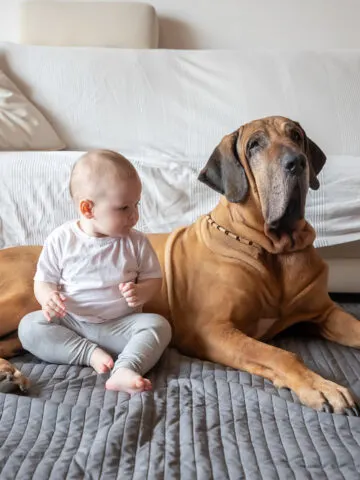You often hear that there is nothing like the bond between a dog and its owner (man’s best friend). Dogs are adaptable animals that bond with their human families, including babies.
Dogs are social creatures and are protective of babies for a variety of reasons.
When you combine their sociability with their pack mentality, herding instincts, and naturally protective traits, it’s understandable why they protect babies.
Dogs can often sense that a baby is vulnerable and will naturally defend it.
In this article, we’ll talk about dogs and why they have a protective instinct for babies.
This will help you understand more about a dog’s nature and determine whether or not a dog is ideal for you and your family. Let’s get started.
Why Dogs Have A Protective Nature
A dog’s natural instinct is to protect those within its pack or family, which includes humans.
This instinct comes from the fact that dogs are derived from wolves, who live according to a social hierarchy. The stronger dogs protect the weaker dogs.
Your dog may become protective of your baby because he views the baby as a weaker being he has to protect.
When new people or animals come into your home, your dog may try to guard the baby. While this can be nice, it can be a nuisance if the people coming into your home are welcome family.
Reasons Why Dogs Are Protective Of Babies
We all know that humans and dogs have an incredible bond. Some scientists have found that when we are with dogs, our bodies release serotonin and dopamine.
These are sometimes referred to as happy hormones. They are associated with putting you in a good mood. Many dogs adapt easily when a little one is introduced into the family.
However, this little human becomes another being that the dog must protect.
Here are some reasons why dogs are protective of babies.
Dogs Have A Pack Mentality
Dogs are descendants of wolves, who have a pack mentality, so your dog identifies your family as their pack. When a new baby arrives, the dog senses that the baby is a weaker part of the pack.
Because of this, your dog’s natural instinct is to protect the baby from anyone or anything they deem harmful.
Dogs Have Herding Instincts
In addition to a dog’s pack mentality, they also have herding instincts. The dog wants to herd and protect their pack, including the baby.
Dogs Mimic The Behavior Of Their Owners
What some people don’t realize is that dogs often mimic the behavior of their owners. Your dog will see that a new baby is not something to be afraid of but something of value.
In turn, they will mimic their owners by protecting the baby, as well.
Dogs Are Social Creatures
Dogs are social creatures, primarily due to their pack mentality. Because of their social qualities, they have a strong bond with their family.
This is why a dog becomes protective of a new baby when they arrive home. The dog and baby will form a strong connection because of the amount of time they spend together.
Both dogs and babies have a desire for attention, so it’s only natural that they would bond.
Some Dog Breeds Have Naturally Protective Traits
Certain breeds of dogs possess naturally protective characteristics or traits. For example, sheepdogs are bred to defend the sheep and herd them together when there is danger.
Other dogs similar to this breed would have a natural protective instinct to protect a baby.
Dogs Can Sense And Pickup on Different Cues
Similar to dogs mimicking the actions of their owners, they can also pick up on different cues. While subtle, dogs can sense that a baby is vulnerable and harmless, so they should protect it.
Like humans, dogs have feelings, so you may see them sniff the baby, but don’t be alarmed.
This is the dog’s way of checking on the well-being of the baby. Mother dogs often do this with their pups to make sure they’re okay.
Benefits Of Dogs And Babies Growing Up Together
The relationship formed when dogs and babies grow up together is unique and should be cherished. There are also physical and psychological benefits for their development.
Here are some reasons why it may be advantageous for your dog and baby to bond.
Babies Are Less Likely To Develop Allergies
When a dog is around, babies often grow up healthier and happier. Research has shown that babies who grow up around dogs are less likely to develop specific allergies.
The baby’s immune system is more resilient when there is a dog in the home.
Dogs Make Babies Happy
When humans and dogs interact, levels of serotonin and dopamine increase. These hormones produce positive feelings. Dogs can bring happiness to babies and, in general, are pleasant to be around.
Dogs Can Teach Children Responsibility
When a baby and dog grow up together, the bond can be mutually beneficial. Dogs help children to understand how to care for an animal, teaching them responsibility.
Furthermore, dogs and children can show love and affection towards each other, which is good for the well-being of both.
Tips When Introducing Dogs And Babies
As mentioned earlier, dogs are very in tune with their humans and sense when something different happens.
When a pregnancy occurs, a dog can sense that something is going on but may not understand what yet. Before you bring your baby home, it is essential to prepare your dog for its arrival.
Here are some tips for encouraging appropriate behavior from your dog when your baby arrives.
Establish Yourself As A Leader
The first thing you should do is establish yourself as the pack leader. This is easy to accomplish within nine months if there are any unwanted habits your dog has to work through.
If necessary, hire a professional to help you train your dog before you bring your newborn home.
Introduce Your Dog To Your Baby’s Scent
Before bringing the baby home from the hospital, bring an item to the dog that has your baby’s scent. This item can be a burp cloth, a small blanket, or anything that smells like your baby.
First, set clear boundaries with your dog. Have the dog sniff from a distance while you’re holding the item and communicate that you’re in charge.
This technique will start the process of creating respect for the baby. If your dog has a favorite spot of their own in the house, don’t put any baby items near this area.
You want to make sure that your dog feels that the spot is still theirs. Finally, make sure that you are calm when introducing the two, as your dog can sense your emotions.
Be Aware Of Your Behavior Around The Dog
You should teach your dog from the beginning to be gentle around the baby. Dogs can sense when we are nervous, anxious, or upset.
They will respond to humans’ verbal cues and body language with the new baby. When an owner has a calm, protective demeanor, the dog will take the cue to be cautious.
Your dog will establish a protective and trustworthy behavior with the infant quickly if there is frequent, calm training.
If your dog exhibits behaviors that you feel you can’t handle, contact a professional trainer for help.
Establish Clear Boundaries In The Nursery
You should establish clear boundaries in the nursery from the beginning. Most professionals recommend starting with the nursery as off-limits.
Make your dog aware that they cannot cross the boundary without your permission. As time increases, you can introduce your dog into the nursery to explore or sniff things in the room.
Then you decide when your dog should leave the room. Repeat this process several times before the baby arrives to let your dog know that they should respect the room.
Related Questions
Why do dogs lick babies’ feet?
When dogs are introduced to babies, they often lick their feet. This is usually because the baby’s feet are exposed, and the dog is curious about what it is.
While it may seem harmless for this to happen, stop your dog from doing this.
Dog saliva can contain harmful bacteria that can make their way into the baby’s mouth. Not to mention your dog also likely enjoys licking underwear.
Babies put their hands and feet in their mouths, and they do it often. When your baby puts their hands and feet in their mouth, the bacteria makes its way into their system.
Can dogs become jealous of babies?
Recent studies have shown that dogs can experience jealousy when their owners show affection toward others. This includes new animals, partners, or children.
Similar to how a child may experience jealousy when a new baby is brought home, a dog can also experience envy.
Jealousy can happen regardless of the dog’s breed or size. Your dog is more likely to get jealous if he is a male. Furthermore, the chances of jealousy increase more when the dog is not neutered or spayed.
It’s important to gradually introduce your dog and baby before bringing your baby home. First, start by introducing your dog to the baby’s scent, then slowly increase the exposure.
Dogs want our complete attention, so if you notice that your dog is becoming jealous, it’s best to contact a professional immediately.
Stacy is a lifelong animal lover who truly believes life just isn’t complete without pets. She’s had pets her whole life (including three dogs and a cat living under the same roof, somewhat harmoniously). She currently resides in NOLA with her husband, son, and two pups, Scooby “Dooby” Doo and Zoey. Stacy always makes a point to learn everything she can about her fur babies, and she has been writing about the pet-parent life for over two years.



Leave a comment
You must be logged in to post a comment.